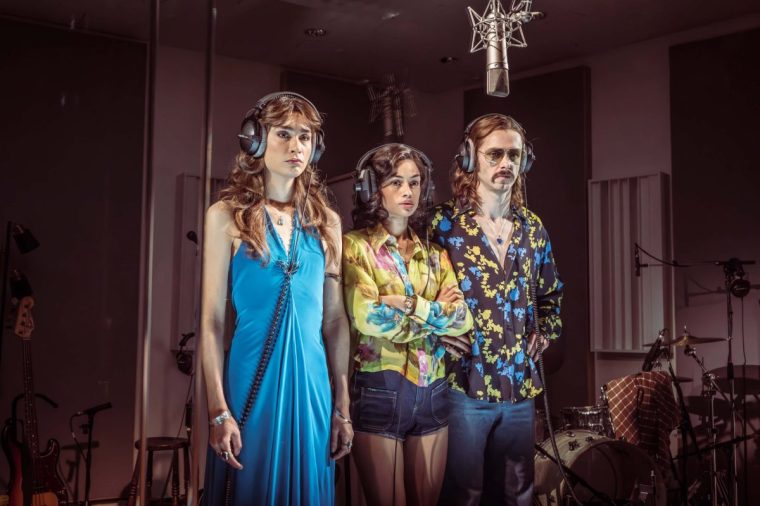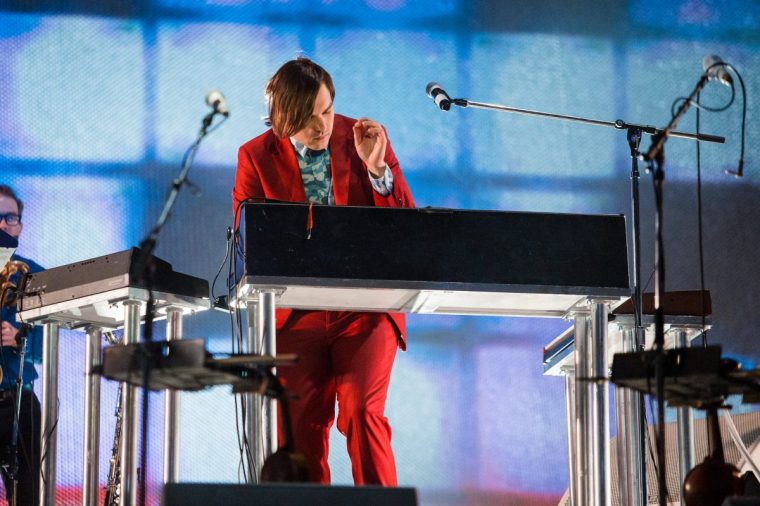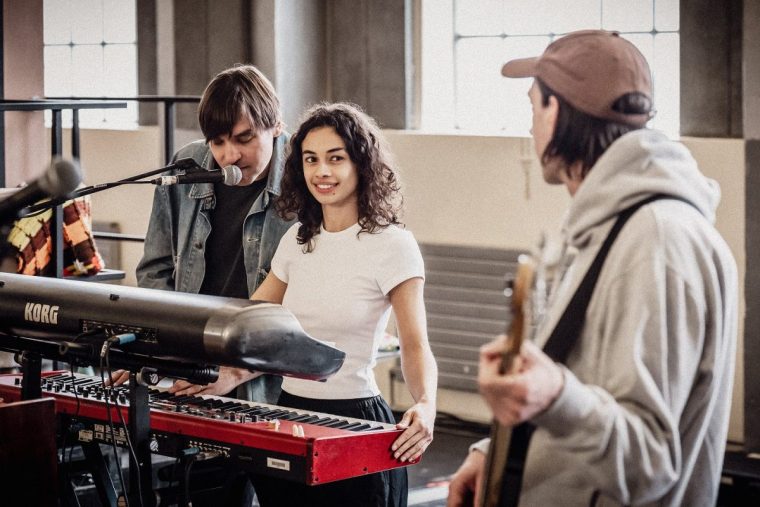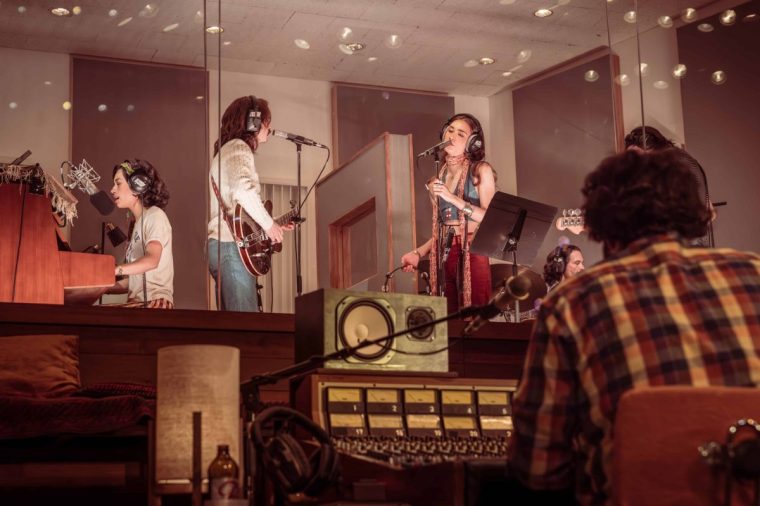Will Butler: 'Leaving Arcade Fire Felt Instinctive – And It's Been Amazing'
It’s 1976, and an Anglo-American rock band are in a Californian studio making the album that is going to catapult them to global superstardom. But all is not well: creative tensions, personal jealousies, secret ambitions, drink and drugs are all tearing the band apart. They go stir crazy working on the same songs for months on end. The members themselves are falling in and out of love. The female singer finally has enough of her relationship with the band’s controlling creative genius. The keyboardist splits with their coke-addled bandmate. The drummer’s wife wants a divorce. The whole thing is taking ages. Is this the price of making great art?
If it sounds like a familiar story – and we’ll get to the lawsuit over the alleged similarities to Fleetwood Mac ’s fabled making of Rumours – then it is precisely the sense of historical recognisability that has helped make Stereophonic the most hyped play of the year. After a nine-month sold out Broadway run that earned it nominations for a record-breaking 13 Tony Awards (it won five, including Best Play), David Adjmi’s “play with music” about a fictional band on the cusp of all-conquering success – with songs written by Will Butler, formerly of Grammy-winning indie rock band Arcade Fire – has arrived in London’s West End at the Duke of York’s Theatre amid five-star reviews and thundering praise.
It’s certainly a play like no other. Set entirely in the recording studio – David Zinn’s set design is beautifully accurate with the 70s aesthetics of its decor, large control room mix desk and raised recording booth behind glass – its fly-on-the-wall document of a band driven to distraction by ambition is never less than engrossing, and often thrilling.

As the band (guitarist Peter, singer Diana, keyboardist Holly, bassist Reg and drummer Simon) lose all sense of perspective with bust-ups and break-ups, with studio workers Grover and Charlie trying gamely to professionally do their job amid the chaos, the audience is invited behind the curtain to see the creative process, warts and all. There are long moments of frustration and boredom; people talk over each other; takes are abandoned; people storm out; there are tears and tantrums, but when it all works: transcendence.
“It’s brutally realistic,” Butler says over a coffee at the central London office of the play’s PR team. “And all my friends who have been in studios and made records are like, ‘Why did you tell me to see this, you asshole? That was not a work of art. That was my life’.”
Stereophonic is very much a timepiece, from the kilo bag of cocaine that is constantly passed around – “My friend’s mum ran a studio in the 70s, and she was like: ‘That’s a very accurately sized bag of cocaine’,” – to the very idea that a rock band would seem so important. It is also a lot to take in: at three hours and 10 minutes long, it has the excessive length of one of the era’s famous double albums.
“I don’t think that was conscious,” Butler says. “But it makes a lot of sense. You want to feel the madness of the band by the end, a little bit like I’ve been stuck with these people forever.” But it is also the feeling of The Beatles: Get Back , Peter Jackson’s eight-hour epic docuseries . Get Back legitimises the idea that watching musicians struggling to create, or even communicate, with sparks of genius among longueurs, can be a form of entertainment.

“And that’s the conceit of this show. People are trying to make art, and people are watching them the whole time. But when you’re watching The Beatles, you’re watching The Beatles. This is a story about making a record that nobody’s ever heard before. It does something to the drama of it that you don’t know where the music’s going.”
It’s taken 11 years to get Stereophonic from an embryonic idea to the West End. In 2014, Butler was put on what he calls a “blind date” work meeting with writer David Adjmi by a friend. The pair hit it off, and Butler, who’d just moved to New York with his wife since 2008, dancer and choreographer Jenny Shore, was interested by Adjmi’s pitch. Butler started to write songs for the project, and eventually went to the auditions to help Adjmi and director Daniel Aukin cast the New York band.
They ended up choosing actors that couldn’t play any instruments (which makes it all the more impressive; the cast play live every night). “In the casting process, I was always very cavalier,” Butler says. “Because I’ve been in bands, and you can be a real idiot and be in a band, and you can be a real idiot and be in a successful band. I’m writing music, and I’m no virtuoso.”
The cast took a six-month crash course in their instruments, even supporting Butler’s new band Will Butler + Sister Squares on tour, before Stereophonic finally opened in October 2023 off-Broadway at the 200-capacity Playwrights Horizons in New York. Butler also helped cast the London band, and has been here since February getting them up to speed.

Butler actually had a deceptively difficult job. Songs had to have the feel of the era, or as Butler says: “Get on the right spiritual page.” He bought old 70s equipment (microphones, amps, guitars), which ended up like a cheat code. “It’s remarkable. You could play Nirvana and it sounds like the 70s.”
He thought about the songs academically – a key text was Richard and Linda Thompson’s I Want To See The Bright Lights Today . “Which is so rich, they’re this married couple, they’re folkies, and they’re drinking, and he’s converting to Islam, and they’re total madness.” He also had a keen sense of pop history’s evolution. “You want it to sound like REM listened to [ Stereophonic ‘s] ‘Seven Roads’ when they were teens, or like Kurt Cobain’s parents played this record. Since we know the future, you do want it on a continuum.”
But the songs also had to be good enough for an audience to believe they can take a band to superstardom. “Okay, make the best music. Great. I’ll try that,” he says, smiling. Butler nailed it with the swaggering blues rock of “Masquerade”, the only song played in full. It sounds like a lost 70s classic.
But the play’s accuracy has been controversial. It is easy to see Lindsey Buckingham and Stevie Nicks in Pete and Diana’s turbulent relationship; likewise John and Christine McVie in Reg and Holly’s split; even Mick Fleetwood got divorced in 1976. Such are the possible similarities that Fleetwood Mac’s former sound engineer and producer Ken Caillat, along with co-author Stephen Steifel, sued the producers, alleging the Stereophonic script was “substantially similar” to passages from their 2012 book Making Rumours .

The case was settled out of court earlier this year, though Adjmi has always denied the play was solely about Fleetwood Mac, saying the initial inspiration came from hearing the Led Zeppelin song “Babe, I’m Gonna Leave You” on in-flight radio; he also took from his own family experiences and music lore more generally.
What did Butler make of the lawsuit? “I mean, it’s a play about myth,” he says. “If you’re gonna make a mythic play about England, you turn to history. You make it about King Henry VIII. You make Wolf Hall with Thomas Cromwell. And this play is mythic art. Those bands of the 70s belong to the ages, they belong to us. And some of the stuff that you see on stage really happened. Some of it is from David’s family.
“The arc of it is its own arc, and it’s its own record, its own music. And there’s something about myth that comes from the real world. And so you want it to be rooted in something.”
Read Next: Billy Idol: Learning I had a son wasn’t a surprise. I had sex with a million people
But has it taken any shine off the play? “I mean, on a crass level, all press is good. When the lawsuit got announced, I think it actually bumped our ticket sales up like 10 per cent. It was brutal, and I would rather it not have happened. And if he had seen himself in the play at all, I wish he had just been like, ‘Wow, I learned something about myself.’ But it’s not his story. It’s its own thing.”
Butler can attest that a fraught studio atmosphere is hardly confined to Fleetwood Mac. “I was in a band with a couple and me and my brother,” he says of Arcade Fire singer-songwriter Win Butler and his wife Régine Chassagne. “And the familial relationships of this play are very applicable. My current band is me, my wife and my wife’s sister, and it’s very real. You’re having these fights that are neither rooted in the work nor rooted in your lives, but in the miasma of one big thing.”
Butler left Arcade Fire in October 2021 (it was announced in March 2022) before allegations of sexual assault against his brother Win in August 2022. Win denies the claims. Butler says he is happy with his decision to leave the band. “It’s been wonderful. I’ve got this crew, and I’ve got my band. It was pretty instinctual leaving the band. It was like, ‘I have a little gas in the tank. I should do something scary.’
“And now I walk to work and my name is on a marquee at the Duke of York’s. It’s really wonderful.”
Stereophonic is on at Duke of York’s Theatre, London until 11 October
Comments
Post a Comment